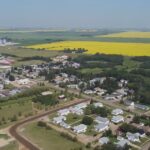In a landmark initiative addressing the often-overlooked mental health needs of rural communities, forestry giant West Fraser has partnered with the Canadian Mental Health Association (CMHA) to launch a comprehensive support program across British Columbia’s remote regions. The collaboration arrives at a critical moment when rural residents continue to face significant barriers to mental health services despite escalating needs.
The partnership, announced Tuesday at West Fraser’s Quesnel operations, commits substantial financial backing to expand CMHA’s rural outreach capabilities through both digital platforms and in-person services. Industry experts have long identified the forestry sector as particularly vulnerable to mental health challenges, with workers facing isolation, economic uncertainty, and high-stress environments.
“Rural communities are the backbone of our forestry operations, but these same communities often lack the mental health infrastructure available in urban centers,” explained Sarah Williamson, West Fraser’s Regional Director of Community Affairs. “This partnership represents our commitment to supporting not just the economic health of these communities, but the wellbeing of the people who make them thrive.”
CMHA data reveals concerning disparities in mental health access across British Columbia’s geography. Rural residents wait an average of 11.2 weeks longer for initial mental health assessments compared to their urban counterparts, with particularly pronounced gaps in northern communities where West Fraser maintains significant operations.
The program introduces several innovative components tailored specifically to rural realities. These include virtual counseling options designed to function with limited internet connectivity, mental health first aid training for community leaders, and specialized support for issues particularly prevalent in resource-dependent communities, such as substance use and economic transition stress.
Mental health professionals with rural experience have praised the industry-led approach. Dr. Eleanor Hargreaves, a clinical psychologist specializing in resource sector mental health, notes the significance of the initiative: “When major employers like West Fraser acknowledge mental health as a priority, it reduces stigma tremendously. In small communities where everyone knows everyone, having your employer openly support mental wellness can transform how people view seeking help.”
The funding arrives as Statistics Canada reports that rural British Columbians are 43% less likely to access mental health services than urban residents, despite experiencing comparable or higher rates of depression, anxiety, and stress-related conditions.
Industry analysts from the business sector point to potential economic benefits beyond the obvious humanitarian goals. “Mentally healthier communities translate to workforce stability and productivity improvements,” noted Raymond Chen, forest industry economist at BC Trade Council. “West Fraser’s investment likely represents sound business strategy alongside social responsibility.”
The announcement has drawn attention from political circles, with both provincial and federal representatives acknowledging the initiative’s alignment with broader mental health policy goals. Rural access to mental health services has increasingly become a bipartisan priority in Canadian healthcare discussions.
Local community leaders have responded enthusiastically to the news. Quesnel Mayor Ron Paull characterized the partnership as “addressing a critical need that has been overlooked for too long,” while highlighting the program’s potential to serve as a model for other resource-dependent communities across Canada.
As mental health continues to gain prominence in public health discussions, this partnership between private industry and established mental health organizations raises an important question: Could corporate engagement in rural mental health services provide a sustainable model for addressing the persistent urban-rural divide in healthcare access across Canada?

























